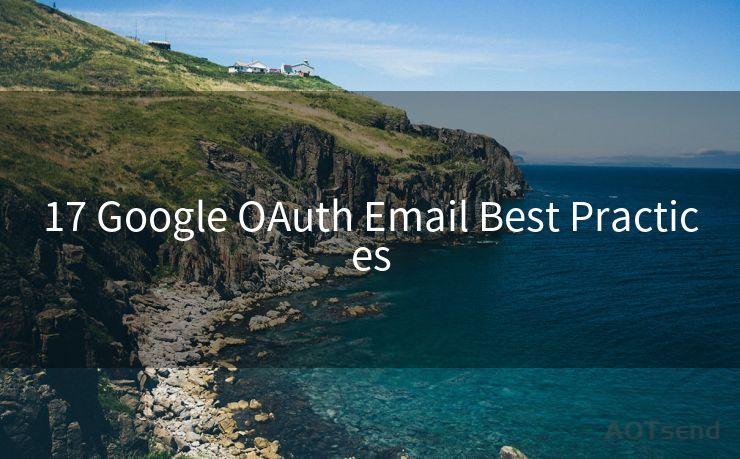17 Google OAuth Email Best Practices




When integrating Gmail or any other Google service into your application using OAuth, it's crucial to follow best practices to ensure secure and efficient access. Here are 17 essential best practices to guide you through the process.
1. Register Your Application
Before you begin, make sure to register your application with the Google API Console. This step is vital for obtaining the necessary credentials, such as the client ID and client secret, which are required for OAuth authentication.
2. Use HTTPS for All Requests
Ensure that all requests to the Google OAuth endpoints and API services are made over HTTPS. This ensures the security of your data in transit.
3. Implement Proper Error Handling
Be prepared to handle errors gracefully. Check the response codes and messages returned by Google's OAuth endpoints to manage failures effectively.
4. Cache Data Appropriately
When caching data retrieved from Google APIs, such as user profiles or email messages, adhere to Google's caching guidelines. Avoid caching data for longer than necessary to maintain freshness.
5. Request the Minimum Required Scopes
Only request the OAuth scopes that are necessary for your application's functionality. Requesting unnecessary scopes can raise privacy concerns and may discourage users from granting access.
🔔🔔🔔
【AOTsend Email API】:AOTsend is a Managed Email Service for sending transactional emails. Support Email Types: reminders, authentication, confirmations, notifications, verification codes, invoices, password resets, account activations, billing statements, two-factor authentication (2FA), and one-time passwords (OTP) emails, etc. $0.28 per 1000 Emails. 99% Delivery, 98% Inbox Rate.
You might be interested in:
Why did we start the AOTsend project, Brand Story?
What is a Managed Email API, How it Works?
Best 25+ Email Marketing Platforms (Authority,Keywords&Traffic Comparison)
Best 24+ Email Marketing Service (Price, Pros&Cons Comparison)
Email APIs vs SMTP: How they Works, Any Difference?

6. Handle Expiration of Access Tokens
Access tokens have a limited lifespan. Implement a mechanism to handle token expiration and request new tokens when necessary.
7. Use Refresh Tokens for Long-Term Access
If your application requires long-term access to a user's data, use refresh tokens to obtain new access tokens when they expire.
8. Protect Your Credentials
Keep your client ID, client secret, and other sensitive credentials secure. Avoid storing them in places where they could be easily accessed by unauthorized individuals.
9. Implement Logging and Monitoring
Set up logging and monitoring to track OAuth-related activities. This helps in identifying and responding to any suspicious or unauthorized access attempts.
10. Follow the Principle of Least Privilege
Ensure that your application only accesses the data it needs and nothing more. This principle enhances security and reduces the risk of data breaches.
11. Educate Users on OAuth Permissions
Provide clear and concise information to users about the OAuth permissions your application is requesting and why they are necessary.
12. Regularly Update Your Application
Keep your application up to date with the latest security patches and updates from Google to ensure optimal security.
13. Implement Secure Coding Practices
Follow secure coding practices to prevent common security vulnerabilities, such as SQL injection or cross-site scripting (XSS) attacks.
14. Use OAuth Libraries
Utilize well-maintained OAuth libraries for your programming language or framework. These libraries often handle complex OAuth flows and security considerations.
15. Test Your OAuth Implementation
Thoroughly test your OAuth implementation to ensure it works as expected and there are no vulnerabilities.
16. Comply with Google's Policies
Familiarize yourself with and adhere to Google's API policies and best practices to avoid any violations.
17. Provide a Secure User Experience
Ensure that the OAuth authentication process is smooth and secure for users. This includes using clear and consistent user interface elements.
By following these 17 Google OAuth Email Best Practices, you can ensure a secure and efficient integration of Gmail or other Google services into your application. Remember, security is an ongoing process, so stay vigilant and keep up with the latest security updates and best practices from Google.




Scan the QR code to access on your mobile device.
Copyright notice: This article is published by AotSend. Reproduction requires attribution.
Article Link:https://www.mailwot.com/p6635.html



